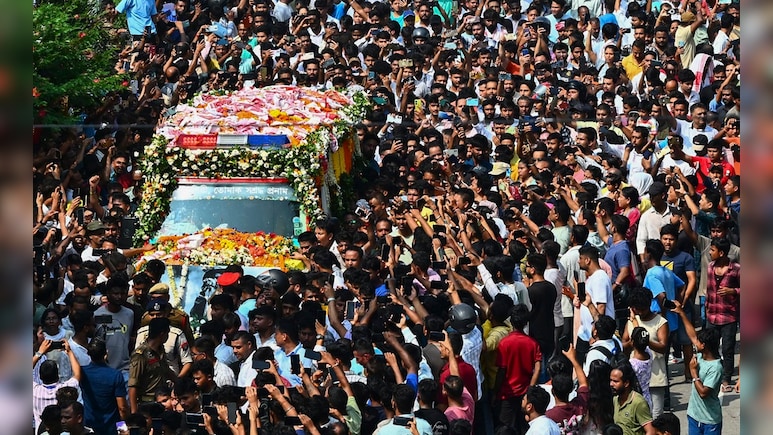
Striking visuals of Nepal's young citizens, national flags and anti-corruption banners in their hands, their slogans ranting through the air, grabbed eyeballs as the world watched the Gen Z bringing the country to its knees and eventually toppling the government.
Generation Z, or Gen Z - referring to people born between 1997 and 2012 - stood at the center of similar movements in Sri Lanka in 2022, Bangladesh in 2024 and Philippines earlier this month.
And so when lakhs of people poured onto the streets of Guwahati to mourn the loss of Assamese music icon Zubeen Garg, the Gen Z again played its part. Albeit this time, the Gen Z was 'Generation Zubeen', a group that encompassed people of a much wider age group united by their love for the melodies voiced by Mr Garg.
Mr Garg had died by drowning in Singapore on September 19. His body reached Guwahati on September 21. Emotions ran high among the 'Gen Z', with several people breaking through barricades and advancing towards Guwahati's Lokpriya Gopinath Bordoloi International Airport, prompting the police to resort to baton-charge.
Normal life froze in the city. Shops closed, services stopped, crowds thronged the streets. Some people even fainted and were taken ill due to the heat in the afternoon. The police made multiple appeals to remain calm and urged the public to maintain law and order. A sea of people waited to bid goodbye to the singer and music composer who struck a chord with the entire generation, blending heart, rebellion and soul.
On September 23, he was cremated with full state honours as Mayabini, a song he wanted to be played as he is laid to rest, turned into a youth anthem.
Through these three days, Generation Zubeen - hooked to his music since he first rose to fame with his debut Assamese album Anamika in 1992 - jammed the streets of Assam. Mr Garg's music was a fusion of rock-tinged numbers and traditional Assamese rhythms. It resonated with the young people who found themselves caught between tradition and modernity. His songs travelled from college canteens to neighbourhood cassette stalls, from night buses to late-night hostel jam sessions. Over a career spanning more than three decades, Mr Garg sang over 38,000 songs in 40 languages and dialects.
Hashtags like ZubeenGeneration, GenerationZubeen and zubeenfanclub continued to trend. "Now I finally get why we're called Gen Z because we're truly the Generation of Zubeen," an X user wrote in the days after his death.
But it was not just Mr Garg's music that made a mark, but also his lack of reluctance to challenge authority, defend diktats, voice his opinions and stand by them. He opposed the long-held custom of animal sacrifices at temples, supported the Citizenship (Amendment) Act (CAA) protests and resisted the ULFA's diktats against singing Hindi and Bengali songs during Bihu, Assam's biggest festival.
After delivering career-defining Hindi songs like 'Ya Ali' from Gangster, 'Dilruba' from Namastey London and 'Dil Tu Hi Bata' from Krrish 3, he eventually returned to Assam, citing the "attitude" he came across in the city. "I will die here (in Assam) like a king," he told POP Pavelopedia in an interview in January.
Between mourning his loss and demanding a fair probe and fixing accountability for his death, Generation Zubeen symbolised largely the singer's impact on Assam's cultural landscape. Assamese youth Hirak Jyoti Bora said, "Generation Zubeen represents a cultural and musical phenomenon in Assam, where Zubeen Garg's legacy continues to inspire and influence new generations of music enthusiasts, artists, indigenous rights defenders, environmentalists, animal conservationists, human rights defenders, academicians and fans. This generation is characterised by their love for Assamese music, culture, and identity, which Zubeen Garg's work has significantly shaped. It reflects the deep connection between Zubeen Garg's way of life, his ethics, moral values, principles and the people of Assam."
Track Latest News Live on NDTV.com and get news updates from India and around the world

